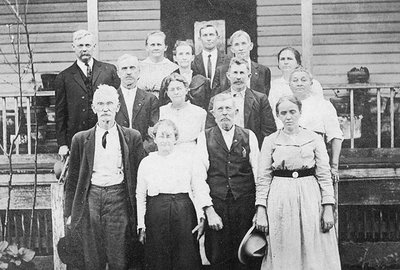Family Stories - Charles William Croft
 Charles is third from left - front row. My grandfather - Henry Bradham Croft with wife Laura are on far right - back row.
Charles is third from left - front row. My grandfather - Henry Bradham Croft with wife Laura are on far right - back row.My great grandfather Croft - Charles William Croft - was a tough man, ready to fight when his word was challenged. He was born in South Carolina, moved as a child to south Georgia with his mother and father, then with his wife Mary Jane (McLeod) and small daughter, he followed his father down to north Florida in 1859. Florida was a wilderness then - the southern frontier. Indians were still roaming free. Roads were almost non-existent, and those that existed were just sandy trails. National politics was going crazy, and war talk was rampant. When the Civil War broke out, he had to leave his family - by then there were two small daughters and another baby on the way. He fought in the war for four years. When he finally got home in early 1865 he found his family starving and never went back. The war was winding down by then anyway.
Times were tough after the war. It was hard to make a living. No one had money. Charles hunted for meat and lived on what they could raise. All he knew was farming, but he worked hard and expected those around him to do the same. After his father died, he packed up the family - by then there were seven children - and moved further south to Pasco County.
In 1874 Charles hired a man by the name of Jim Smith to help gather his crops. He agreed to pay Smith $15 per month for a period of three months. After just a month, Smith quit, claiming Charles worked him too hard. Charles refused to pay him because he quite before the work was done. Smith filed a suit demanding $15 for his pay. Charles went to Brooksville and hired a lawyer - Charles Harrison - for $15 to defend the suit. It was Harrison's first case. The story of the trial appears in a book of Harrison's memories called Reminiscences, published in 1997. Harrison put on a successful defense and received $15 for his fee. Smith became furious at the outcome and began cursing the court, the judge, the lawyer, and Charles. A fight broke out in the courtroom. Charles and Smith went at it until Smith was subdued. Charles won the suit and the fight, and although he had to pay the $15 to the lawyer, he had stood up for what he considered right.
During the next twenty years, Charles acquired several large orange groves, built a packing house, and became a wealthy man, eventually fathering eleven children. He lost it all though in a hard freeze that wiped out his groves. That was 1895. He never replanted the orange trees, but chose to live out his days raising vegetables. He lived for another 23 years, dying at the age of 83.
In 1889, former Lt. Gov. Milton Mabry retired from politics and built a large home on a hill about 1/2 mile from the home of Charles Croft. He wrote of the economic effects of the 1895 freeze, mentioning in particular the plight of his neighbor. The mercantile house of Coleman & Ferguson extended credit to those hurt by the freeze. Charles Croft "drew heavy on them and continued to do so even after the freeze when all hopes for payment were gone..." They continued to honor him. "He would come in and pay a little and charge his account with much more. One day he was asked how he ever expected to get even and if he knew how much he owed. He replied that, yes, he knew. He owed them enough to be considered a partner." The debt was paid out of his estate - his land - after his death

0 Comments:
Post a Comment
<< Home